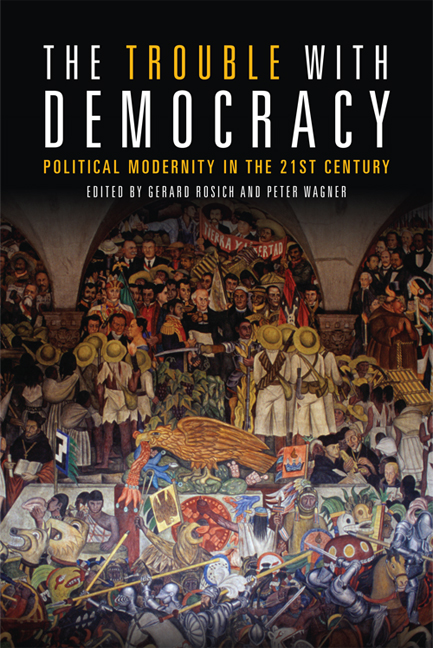Book contents
- Frontmatter
- Contents
- Acknowledgements
- List of Contributors
- 1 Introduction: Re-Interpreting Democracy for Our Time
- 2 Autonomy in and between Polities: Democracy and the Need for Collective Political Selves
- 3 Rethinking ‘Modern’ Democracy: Political Modernity and Constituent Power
- 4 Democratic Surplus and Democracy-in-Failing: On Ancient and Modern Self-Cancellation of Democracy
- 5 Setbacks of Women's Emancipation (Condition, Consequence, Measure and Ruse)
- 6 Political Modernity, Democracy and State–Society Relations in Latin America: A New Socio-Historical Problématique?
- 7 Communitarian Cosmopolitanism: Argentina's Recuperated Factories, Neoliberal Globalisation and Democratic Citizenship. An Arendtian Perspective
- 8 Middle-Classing in Roodepoort: Unexpected Sites of Post-Apartheid ‘Community’
- 9 Democracy and Capitalism in Europe, Brazil and South Africa
- 10 From Realism to Activism: A Critique of Resignation in Political Theory
- 11 The World as We Find It: A Suggestion for a Democratic Theory for Our Times
- 12 Epilogue: Democracy as Capacity for Self-Transformation
- Index
6 - Political Modernity, Democracy and State–Society Relations in Latin America: A New Socio-Historical Problématique?
Published online by Cambridge University Press: 05 September 2016
- Frontmatter
- Contents
- Acknowledgements
- List of Contributors
- 1 Introduction: Re-Interpreting Democracy for Our Time
- 2 Autonomy in and between Polities: Democracy and the Need for Collective Political Selves
- 3 Rethinking ‘Modern’ Democracy: Political Modernity and Constituent Power
- 4 Democratic Surplus and Democracy-in-Failing: On Ancient and Modern Self-Cancellation of Democracy
- 5 Setbacks of Women's Emancipation (Condition, Consequence, Measure and Ruse)
- 6 Political Modernity, Democracy and State–Society Relations in Latin America: A New Socio-Historical Problématique?
- 7 Communitarian Cosmopolitanism: Argentina's Recuperated Factories, Neoliberal Globalisation and Democratic Citizenship. An Arendtian Perspective
- 8 Middle-Classing in Roodepoort: Unexpected Sites of Post-Apartheid ‘Community’
- 9 Democracy and Capitalism in Europe, Brazil and South Africa
- 10 From Realism to Activism: A Critique of Resignation in Political Theory
- 11 The World as We Find It: A Suggestion for a Democratic Theory for Our Times
- 12 Epilogue: Democracy as Capacity for Self-Transformation
- Index
Summary
Does Latin America exist?
When dealing with modernity and the political in Latin America, in the sense given to both terms in this book, an initial question is related to the concept of the region under consideration. For some observers, the process of globalisation led to very different forms of insertion into it and answers to it, so that it is not possible to speak of Latin America in general and we should instead distinguish between the Southern cone countries, Brazil being the central and fundamental one there; the Central American countries; Mexico, more tied to the North American pole; and the Andean countries that have lived most intensely the problems of destruction and recomposition of the matrix of the national-popular state, to which I will refer later. In such a view, these countries cannot be seen today as affected by a single common problématique and, consequently, ‘Latin America’ would disappear as a historic expression with a ‘real’ content, beyond the purely rhetorical or imaginary.
Here, instead, we will insist on the idea of Latin America, without entering into the eternal discussion, coming from the international organisations, about which countries or types of countries to include or not under this label. The reason to defend, in a globalised world, the idea of countries, societies, nations or national and multinational states, and the idea of Latin America, is not only affective or historical. It is based on the insight that it is impossible to conceive of the insertion in the globalisation processes by each country separately. Beyond all the vicissitudes Europe is currently experiencing, a very strong message or signal emerges from there: the affirmation that globalisation and this century's world will develop in a complex game of nation-states and supranational blocks, in which there is no destiny for countries that do not enter into a block – with the exception of those few countries that comprise each such a large share of the world population that they can avoid block formation.
Latin American societies, beyond the rhetoric of regional integration, are facing hard decisions in issues such as energy, environment, knowledge society, new strategic branches of the economy, in all of which a substantial leap in the process of autonomous insertion is necessary if the countries do not want to be condemned to the periphery.
- Type
- Chapter
- Information
- The Trouble with DemocracyPolitical Modernity in the 21st Century, pp. 121 - 147Publisher: Edinburgh University PressPrint publication year: 2016



